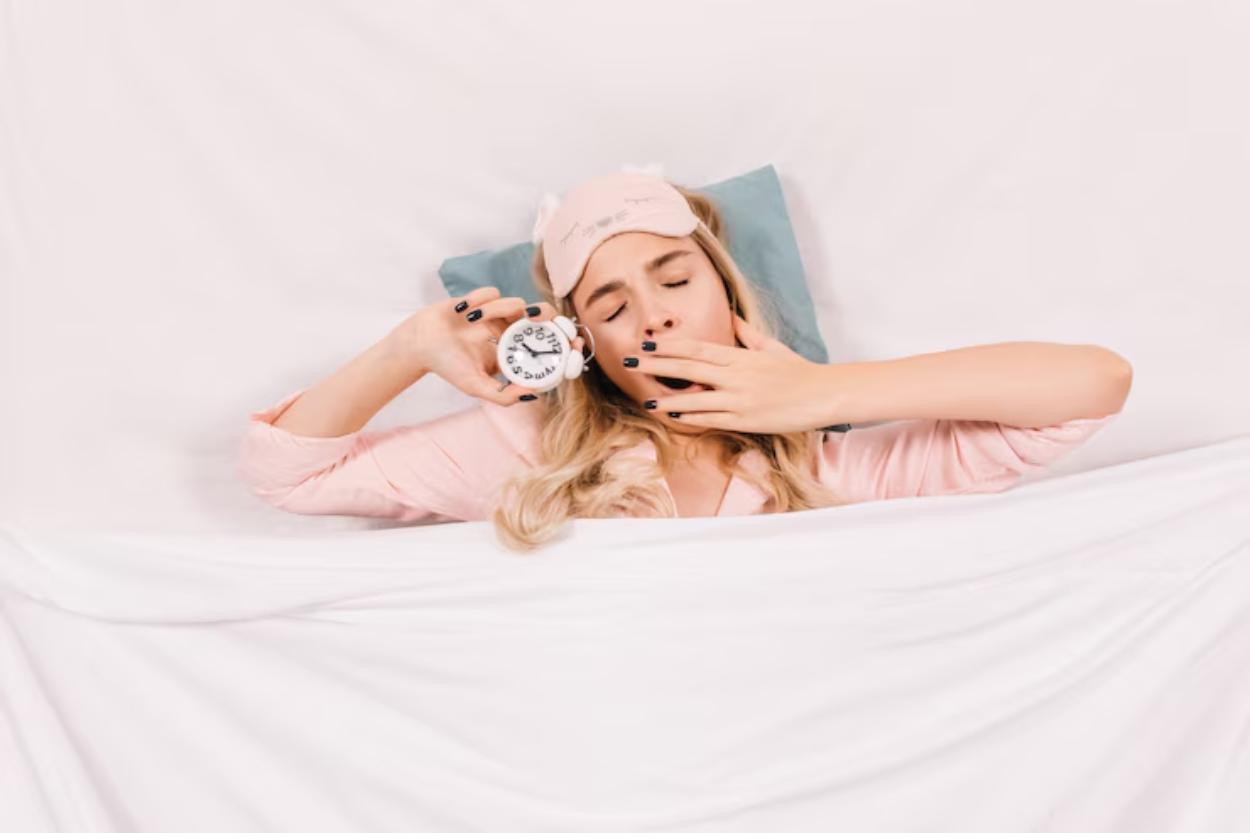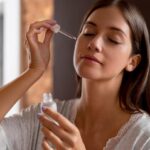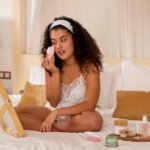You’ve likely come across the term “beauty sleep,” but does it really live up to the hype? The short answer is yes – your sleep quality and nighttime routine have a bigger impact on your skin than you might think.
When you don’t get enough sleep, it shows on your face. Dark circles, dull skin, and breakouts aren’t just coincidences. There’s real science behind why a good night’s sleep can make you look and feel better.
How Your Skin Changes While You Sleep
Your skin doesn’t just shut down when you go to bed. In fact, your skin becomes more active at night, focusing on repairing and rejuvenating itself.
Cell Repair and Renewal
- While you’re in deep sleep, your body releases more growth hormones, which aid in repairing damaged skin cells and generating new ones. You can think of it as your skin’s overnight repair team.
- Your skin cell turnover rate increases by up to 25% while you sleep. This means old, damaged cells get replaced faster with fresh, healthy ones.
Blood Flow Increases
- Blood flow to your skin increases during sleep, bringing oxygen and nutrients to your face. This is why you might notice a natural glow after a good night’s rest.
- Poor sleep reduces this blood flow, which can make your skin look pale or tired.
Collagen Production
- Your body makes more collagen during sleep. Collagen keeps your skin firm, smooth, and bouncy without enough sleep, collagen production drops, which can lead to fine lines and sagging over time.
How Much Sleep Does Your Skin Need
Most adults need 7-9 hours of sleep per night for optimal skin health.
Deep Sleep Stages Matter Most
Most of your skin’s repair happens during the deeper stages of sleep. If you’re waking up often or having light sleep, your skin doesn’t get the full restorative benefits.
Signs you’re not getting quality sleep:
- Waking up multiple times during the night
- Feeling tired even after 8+ hours in bed
- Taking a long time to fall asleep
- Snoring or sleep apnea
What Sleep Deprivation Does to Your Skin
When you regularly get insufficient sleep, your skin shows the effects in multiple ways.
Increased Cortisol Levels
Lack of sleep raises cortisol (stress hormone) levels. High cortisol breaks down collagen and can trigger inflammation, leading to:
- Acne breakouts
- Eczema flare-ups
- Slower wound healing
- Increased sensitivity
Dehydration and Dullness
Sleep helps regulate your body’s hydration levels. Poor sleep can leave your skin dehydrated, making it look dull and feel tight.
You might also notice more prominent fine lines when your skin is dehydrated.
Dark Circles and Puffiness
Those under-eye bags aren’t just from rubbing your eyes. Lack of sleep causes the blood vessels beneath the delicate skin around your eyes to expand, leading to the formation of dark circles.
Insufficient sleep also disrupts lymphatic drainage, resulting in puffiness around the eyes.
Building a Skin-Friendly Night Routine
A solid nighttime routine can help you get the most out of your beauty sleep. Here’s what really makes a difference:
2 Hours Before Bed
- Stop eating heavy meals. Digestion can interfere with deep sleep stages when your skin repairs itself.
- Dim bright lights, especially blue light from phones and computers. Blue light can interfere with your body’s natural sleep hormones, disrupting your sleep cycle.
1 Hour Before Bed
- Begin with a lower concentration (0.25-0.5%) and apply it every other night to minimize the risk of irritation.
- Set your bedroom temperature between 65-68°F (18-20°C). Your body temperature naturally drops during sleep, and a cool room helps this process.
Your Skincare Routine
Keep it simple but effective:
- Gentle cleanser – Remove the day’s dirt and makeup
- Treatment products – Retinol, acids, or serums work best at night
- Moisturizer – Lock in hydration for overnight repair
- Eye cream – The delicate eye area needs extra moisture
Sleep Position Matters
- Sleeping on your back is best for your skin. Side sleeping can cause sleep lines that become permanent over time.
- If you must sleep on your side, use a silk or satin pillowcase. These materials cause less friction and pull on your skin.
Night Skincare Ingredients That Work
Certain ingredients are more effective when used at night because they can make your skin sensitive to sunlight.
Retinol and Retinoids
These vitamin A derivatives speed up cell turnover and boost collagen production. They work best at night because they break down in sunlight.
- Start with a low concentration (0.25-0.5%) and use every other night to avoid irritation.
Alpha Hydroxy Acids (AHAs)
- Glycolic acid and lactic acid exfoliate the skin by removing dead cells, uncovering a brighter complexion. They also enhance the absorption of other skincare products.
- Use AHAs 2-3 times per week at night, and always wear sunscreen during the day.
Peptides
- These protein fragments signal your skin to produce more collagen. They’re gentle enough for nightly use and work well with other anti-ageing ingredients.
Niacinamide
- This type of vitamin B3 helps reduce inflammation, regulate oil production, and boost your skin barrier. It’s gentle enough for nightly use and works well with other skincare ingredients.
Common Beauty Sleep Mistakes
Even with good intentions, it’s easy to mess up your beauty sleep routine.
Sleeping with Makeup On
- This blocks your pores and prevents your skin from breathing and renewing itself properly. Always cleanse before bed, even if you’re tired.
Using Too Many Products
- More isn’t always better. Using too many active ingredients can irritate your skin and interfere with sleep.
Dirty Pillowcases
- Your pillowcase collects oil, bacteria, and dead skin cells. Change it at least twice a week or daily if you have acne-prone skin.
Sleeping in Hot Rooms
- Heat can make you sweat more, potentially clogging pores. It also disrupts deep sleep stages when your skin repairs itself.
Foods That Support Beauty Sleep
What you eat affects both your sleep quality and skin health.
Sleep-Promoting Foods
- Cherries – Natural source of melatonin
- Almonds – Contain magnesium, which helps muscle relaxation
- Fatty fish – Omega-3s reduce inflammation
Foods to Avoid Before Bed
- Caffeine (even dark chocolate)
- Alcohol (disrupts sleep stages)
- Spicy foods (can cause heartburn)
- High-sugar snacks (cause blood sugar spikes)
When to See Results
Don’t expect overnight miracles (pun intended). Here’s a realistic timeline:
1-2 Weeks
- Less puffiness and dark circles
- Skin feels more hydrated
- Overall, the complexion looks brighter
4-6 Weeks
- Improved skin texture
- Fewer breakouts
- Fine lines may appear less noticeable
3+ Months
- Significant improvement in skin firmness
- More even skin tone
- Long-term anti-ageing benefits become visible
Creating the Perfect Sleep Environment
Your bedroom setup affects both sleep quality and skin health.
Humidity Levels
- Keep humidity between 30-50%. If it is too dry, your skin loses moisture; if it is too humid, bacteria can thrive.
- Use a humidifier in winter or if you live in a dry climate.
Air Quality
- Clean air helps prevent skin irritation.
- Change your HVAC filters regularly to reduce dust and allergens.
Blackout Conditions
- Complete darkness helps your body produce melatonin naturally.
Beauty Sleep for Different Skin Types
Your skin type affects what kind of nighttime routine works best.
Oily Skin
- Use oil-free, non-comedogenic products
- Salicylic acid to prevent clogged pores
- Lightweight, gel-based moisturizers
Dry Skin
- Rich, creamy moisturizers
- Face oils as the last step
- Hyaluronic acid serums
- Gentle, cream-based cleansers
Sensitive Skin
- Fragrance-free products
- Gentle ingredients like ceramides and peptides
- Patch test new products
- Simple routines with fewer products
Combination Skin
- Different products for different areas
- Lightweight moisturizer on oily T-zone
- Richer cream on dry cheeks
- Spot treatments for problem areas
Role of Stress in Beauty Sleep
Stress affects both your sleep quality and skin health. High-stress levels can:
- Make it harder to fall asleep
- Reduce deep sleep stages
- Increase cortisol production
- Worsen skin conditions like acne and eczema
Stress-Reduction Techniques
- Deep breathing exercises before bed
- Progressive muscle relaxation
- Journaling to clear your mind
- Meditation or mindfulness apps
- Gentle stretching or yoga
Technology and Beauty Sleep
Blue Light Effects
Blue light from phones, tablets, and computers can:
- Suppress melatonin production
- Make it harder to fall asleep
- Reduce deep sleep quality
Solutions
- Use blue light filters on devices
- Stop screen time 1-2 hours before bed
- Keep phones out of the bedroom
- Use red or amber lighting in the evening
Supplements for Better Beauty Sleep
While a good routine and environment are most important, some supplements might help.
Melatonin
- Start with the lowest dose (0.5-1mg) about 30 minutes before bedtime.
Magnesium
- Helps relax muscles and calm the nervous system.
Collagen Peptides
- Some people find that taking collagen supplements supports skin health, though results vary.
Tracking Your Beauty Sleep Progress
Keep track of your sleep and skin changes to see what works.
Sleep Tracking
- Hours of sleep per night
- How long it takes to fall asleep
- Number of times you wake up
- How rested you feel in the morning
Skin Tracking
- Take weekly photos in the same lighting
- Note any breakouts or skin reactions
- Track how your skin feels (tight, oily, smooth)
- Record which products you’re using
Seasonal Adjustments for Beauty Sleep
Winter
- Use richer moisturizers
- Add a humidifier to combat dry air
- Consider facial oils
- Protect against harsh winds during the day
Summer
- Lighter, gel-based products
- Don’t skip moisturizer even if it’s humid
- Wash pillowcases more frequently
- Stay hydrated in hot weather
Professional Treatments That Support Beauty Sleep
Some professional treatments work best when combined with good sleep habits.
Chemical Peels
- Professional peels remove damaged skin layers, and your skin heals best during sleep.
Microneedling
- This treatment creates tiny wounds that heal during your sleep cycle when the growth hormone is highest.
LED Light Therapy
- Red light therapy can be done at home in the evening to support collagen production during sleep.
Common Questions About Beauty Sleep
Can you catch up on beauty sleep on weekends?
- While weekend sleep can help you feel better, your skin benefits most from consistent, nightly sleep. Irregular sleep patterns can actually make skin problems worse.
Does sleeping position really matter for wrinkles?
- Yes, but don’t stress too much about it. If you’re a side sleeper, a silk pillowcase and a good skincare routine are more important than forcing yourself to sleep on your back.
How long before I see results from better sleep?
- You should start seeing visible changes in reduced puffiness and enhanced brightness within just a few days. Longer-term benefits like improved texture and fewer fine lines take 4-12 weeks.
What to Do Next
Now that you understand how sleep affects your skin, here are your next steps:
This Week
- Set a consistent bedtime and stick to it
- Remove screens from your bedroom
- Start a simple nighttime skincare routine
This Month
- Track your sleep and skin changes
- Adjust your routine based on what you notice
- Consider adding one new beneficial ingredient
Long Term
- Make sleep a priority, not something you sacrifice
- Build habits that support both good sleep and skin health
- Be patient – real results take time
Remember, beauty sleep isn’t just about looking good – it’s about giving your skin the time and conditions it needs to stay healthy. Good sleep habits today mean better skin for years to come.





